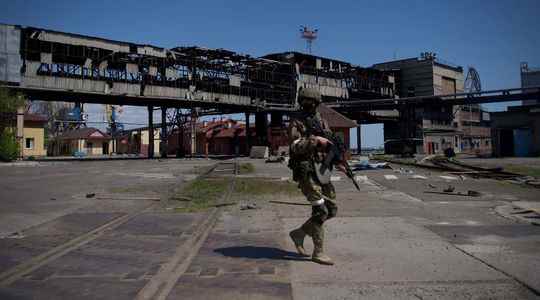Will he be respected? While Moscow has repeatedly promised the cessation of fighting to allow the evacuation of civilians in Mariupol in the past, a unilateral Russian ceasefire of three days has been promised by the general staff. Since the beginning of the week, the invader’s soldiers have been pounding the Azovstal steelworks, the last bastion of Ukrainian resistance in this strategic port city.
- Truce demanded by kyiv, decided by Moscow
“The Russian armed forces will open a humanitarian corridor from 8 a.m. to 6 p.m. Moscow time from the site of the Azovstal metallurgical plant to evacuate civilians,” the Defense Ministry said in a statement late Wednesday. Moscow’s decision to temporarily cease fighting comes as hundreds of civilians have been living since the start of Russia’s invasion of Ukraine on February 24 in World War II-era underground galleries running beneath the factory. ‘Azovstal. Copiously bombarded for two days, the strategic site of this city offers access to the Sea of Azov and would allow Russian forces to connect the Donbass region, partly controlled by their supporters, to Crimea which Moscow annexed in 2014. All civilians who have taken refuge in the factory should be allowed to reach Russia or the territories controlled by kyiv.
This is a humanitarian breakthrough that Ukraine, through the voice of its president, has been calling for for several days. “There are still civilians. Women, children,” Volodymyr Zelensky said in a video message on Wednesday. He urged, during a telephone exchange, UN Secretary General Antonio Guterres to help “save” the wounded in these ruined facilities. 344 people were reportedly evacuated on Wednesday from Mariupol and its surroundings to Zaprorijjia, a town under Ukrainian control some 230 km away. An operation which follows that piloted by the UN, Sunday, allowing the evacuation of a hundred civilians trapped in Azovstal. A Security Council meeting devoted to Ukraine is scheduled for Thursday evening in New York.
- Fighting in the rest of Ukraine
In the rest of Ukraine, Russian forces are continuing their military operations in parallel, hitting numerous targets. From Lviv to the hitherto preserved mountainous region of Transcarpathia, not far from the Hungarian border, Russian strikes follow one another. In the village of Chandrygolove, in the Donetsk region, a Russian strike left two dead and eleven injured, Governor Pavlo Kyrylenko said.
Explosions were also heard in Mykolaiv, in the south. “Thanks to the successful actions of the Ukrainian defenders, the enemy has lost control of several localities near the Mykolaiv and Kherson regions,” the Ukrainian army reacted on Thursday morning.
- Russia is preparing for the nuclear scenario
Moscow announced in the evening that its army had simulated the firing of nuclear-capable missiles in the Russian enclave of Kaliningrad, located between Poland and Lithuania, two member countries of the EU. More than 100 soldiers participated in these exercises.
Combat units also practiced “operations under conditions of radiation and chemical contamination”, the Russian Defense Ministry said. Russia placed its nuclear forces on high alert shortly after sending troops to Ukraine on February 24.
- European sanctions continue
Europe maintains its policy of sanctions against Russia since a sixth package of sanctions against Russia was presented on Wednesday. Among the main measures, the European Union proposes to exclude three Russian banks hitherto exempt from the international monetary and financial system, Swift, including Sberbank, the largest Russian institution.
From Chisinau, the Moldovan capital, the President of the European Council Charles Michel announced that the Europeans planned “this year to considerably increase (their) support for Moldova by delivering additional military equipment to its armed forces”. Moldova holds its breath after several explosions in its cross-border territory with Ukraine. The European Commission is above all committed to an embargo on Russian oil.
- European embargo on Russian oil
On Wednesday, the European Commission presented a text setting up a progressive embargo of Russian oil. It is now up to the Member States to approve this plan. In this case, “we will gradually give up Russian deliveries of crude oil within six months and those of refined products by the end of the year”, detailed in Strasbourg the President of the Commission Ursula von der Leyen. To achieve the unanimity of the 27 hoped for, the Commission is counting on the temporary exemption for Hungary and for Slovakia, two landlocked countries and totally dependent on Russian deliveries which will be able to continue their purchases from Russia during the year 2023.
Hungary has expressed its reservations about the project as it stands, drawing the wrath of the Ukrainian government. “If a country opposes an embargo on Russian oil, it means one thing: this country is on the side of the Russians and it shares the responsibility for everything that is done by Russia in Ukraine”, accused the Ukrainian minister of Foreign Affairs, Dmytro Kouleba. Direct consequence of the European announcement: oil prices soared on Wednesday.
